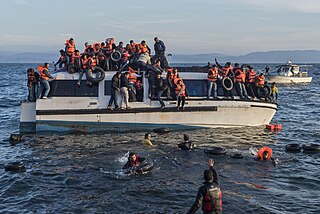Related Research Articles

Forced displacement is an involuntary or coerced movement of a person or people away from their home or home region. The UNHCR defines 'forced displacement' as follows: displaced "as a result of persecution, conflict, generalized violence or human rights violations".

The Center for International Forestry Research (CIFOR) is a non-profit scientific research organization that conducts research on the use and management of forests with a focus on tropical forests in developing countries. CIFOR, which merged with World Agroforestry on Jan. 1, 2019, is the forestry and agroforestry research center of the Consultative Group on International Agricultural Research (CGIAR), a network of 15 research centers around the world that focus on agricultural research for sustainable development, working closely with governments and other partners to help develop evidence-based solutions to problems related to sustainable agriculture and natural resource management.

Environmental migrants are people who are forced to leave their home region due to sudden or long-term changes to their local or regional environment. These changes compromise their well-being or livelihood, and include increased drought, desertification, sea level rise, and disruption of seasonal weather patterns. Though there is no uniform, clear-cut definition of environmental migration, the idea is gaining attention as policy-makers and environmental and social scientists attempt to conceptualize the potential social effects of climate change and other environmental degradation, such a deforestation or overexploitation.


The Graduate Institute of International and Development Studies, or the Geneva Graduate Institute, abbreviated IHEID, is a government-accredited postgraduate institution of higher education located in Geneva, Switzerland.

The Oxford Department of International Development (ODID), or Queen Elizabeth House (QEH), is a department of the University of Oxford in England, and a unit of the University’s Social Sciences Division. It is the focal point at Oxford for multidisciplinary research and postgraduate teaching on the developing world.
Institute for the Study of International Migration is a private research institute located in Washington, DC. Founded in 1998 as part of Georgetown University's School of Foreign Service, it is associated with the Georgetown University Law Center. The Institute for the Study of International Migration (ISIM) is an innovative multidisciplinary center that studies the social, economic, environmental, and political dimensions of international migration.
Migration studies is the academic study of human migration. Migration studies is an interdisciplinary field which draws on anthropology, prehistory, history, economics, law, sociology and postcolonial studies.

The Development Policy Centre (Devpol) is an aid and development policy think tank based at the Crawford School of Public Policy in the College of Asia and the Pacific at the Australian National University. Devpol undertakes independent research and promotes practical initiatives to improve the effectiveness of Australian aid, to support the development of Papua New Guinea and the Pacific Islands region, and to contribute to better global development policy.
The International Centre for Counter-Terrorism (ICCT) is an independent think-and-do tank providing multidisciplinary policy advice and practical support focused on prevention, the rule of law and current and emerging threats three important parts of effective counter-terrorism work. ICCT's work focuses on themes at the intersection of countering violent extremism and criminal justice sector responses, as well as human rights related aspects of counter-terrorism. The major project areas concern countering violent extremism, rule of law, foreign fighters, country and regional analysis, rehabilitation, civil society engagement and victims' voices.
The Department of Social Policy and Intervention is an interdisciplinary centre for research and teaching in social policy and the systematic evaluation of social intervention based in the Social Sciences Division of the University of Oxford. It dates back to Barnett House, a social reform initiative founded in 1914 by a reform movement clergyman, Samuel Barnett, becoming a department of Oxford in 1961.
The Columbia University Partnership for International Development (CUPID), is a student-led initiative across Columbia University to facilitate multidisciplinary dialogue, awareness, and action in the field of international development and relief.
The International Association for the Study of Forced Migration (IASFM) is a professional association for academics and practitioners involved in the field of forced migration.

Alexander Betts is Professor of Forced Migration and International Affairs, William Golding Senior Fellow in Politics at Brasenose College, and Associate Head of the Social Sciences Division at the University of Oxford.
Dawn Chatty, is an American Emerita Professor of Anthropology and Forced Migration, who specialises in the Middle East, nomadic pastoral tribes, and refugees. From 2010 to 2015, she was Professor of Anthropology and Forced Migration at the University of Oxford and from 2011 to 2014, Director of the Refugee Studies Centre.
Susan Lee McGrath is a Professor Emerita in the School of Social Work at York University and former director of York's Centre for Refugee Studies.
Roger Zetter is Emeritus Professor of Refugee Studies, former Director of the Refugee Studies Centre at University of Oxford and the founding editor of the Journal of Refugee Studies, published by Oxford University Press. His teaching, research, publications and consultancy on forced displacement, refugee and humanitarian affairs include all stages of the refugee and displacement cycle.
Oxford Monitor of Forced Migration (OxMo) is a biannual publication engaging in a global intellectual dialogue about forced migration, supported by the Refugee Studies Centre at the University of Oxford.
Jane Alexandra McAdam is an Australian legal scholar, and expert in climate change and refugees. She is a Scientia Professor at the University of NSW, and is the inaugural Director of the Kaldor Centre for International Refugee Law. She is a Fellow of the Academy of Social Sciences. She was awarded an Order of Australia in 2021 for “distinguished service to international refugee law, particularly to climate change”.

The Local Engagement Refugee Research Network (LERRN) is a team of researchers and practitioners supporting work on the inclusion of refugees in public policy and the localization of refugee research. The group is hosted by Carleton University in Canada.
References
- ↑ Department of International Development, University of Oxford, UK.
- ↑ Refugee Studies Centre, University of Oxford, UK.
- ↑ Refugee Studies Centre, University of Oxford, UK.
- ↑ Forced Migration Online Archived 12 August 2008 at the Wayback Machine .
- ↑ "New issue of Oxford Monitor of Forced Migration now online — Refugee Studies Centre".
- ↑ "Clubs and societies — Refugee Studies Centre".
- ↑ "Clubs and societies — Refugee Studies Centre".
- ↑ "Publications — Refugee Studies Centre".
- ↑ "Mission of the IASFM". IASFM. Retrieved 28 January 2016.
- ↑ "People — Refugee Studies Centre".
